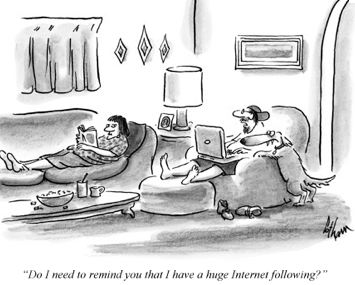
Look out “I Are Cute Kitten.” There’s a new cat in town, and she says No No No No. And according to research it’s the funniest video out there.
Google is trying to create an algorithm that ranks a video in terms of humor/comedy. Here’s an article about the subject, and here’s a BBC World Service Radio interview I just did live on the topic. Humor is a difficult thing for a computer to detect, but I do think we can collect viewer reactions to draw conclusions.
I spoke last year at the International Society for Humor Studies (see presentation) and the academics and psychologists were having trouble agreeing on the constructs and classifications of humor. It’s a bit like sculpting fog to predict what makes us laugh.
Can Google do it? It is a company made up mostly of engineers. It won’t be an easy or precise task, but I won’t rule it out.
Naturally I DO think that humor can be researched based on human reactions. That’s why (as seen below) I always test my videos behind one-way glass with indepth interviews and focus groups.
Tag Archives: ishs
A Funny Thing Happened on the Way to the Funny Conference
So I’m sitting at Starbucks at 3, and I’ll be on stage in about 33 minutes. My presentation looks perhaps like a hotdog long before it takes that edible, if somewhat phallic, shape. Despite my morning’s panic attack, missing a flight and driving the 7 hours to Boston, I manage to catch YouTube Hall-of-Famer Michael Buckley as I pass his town. Sadly he has “a doctor’s appointment” that precludes a quick spanking or whatever YouTubers do when they meet.
It’s 3:03 as I reorder slides, fundamentally changing my entire presentation (shown below on Slideshare) I can’t help but get distracted by two nervous looking band members who appear to be meeting a new digital marketer consultant. “Our last guy, um, got really busy with school,” says Shaggy (his real name is being withheld because I don’t know it). The consultant begins to LAY IT ON THICK. Total bullshit, coated with a thick creamy topping of arrogance and a faux-pedantic snobbery crowning it all like an overly marinated cherry on top.
The topic of viral video comes up, and my face begins to literally contort as I hear the crap this guy’s advising. I couldn’t control my face. I could see some gal looking at me, and then over at them… making the connection. But I can’t help myself. When Shaggy says “I’m not willing to lose my integrity to get 3 million views on YouTube,” I think seriously about coming to his rescue. But something about this consultant strikes me as odd and dangerous. He’s far too assertive, simplistic, narcissistic, simplistic and repetitive (seems we loathe that in others that we resent in ourselves).
As I’ve finally shifted back to my presentation, literally changing the entire thesis at this point with minutes to spare, the consultant BARGES out the door of Starbucks leaving Shaggy and Scooby stunned. Again I decide to go to their rescue, hold their hand, and tell them that one need not compromise their virtues to go viral… I’ll even volunteer. But just like a dream ending abruptly, they vanish. Come to think of it, maybe it was a dream. No… I’m pretty sure it was real.
Then I gave this presentation below. To show that humor is hard to categorize because of its subjectivity, I did a live vlog (seen at the end of this video) where I followed the 102nd rule of “winning over an audience.” I secretly maligned them using a stage whisper. I was actually kinda bummed out they laughed, which is not what I expected after reading this Joel Warner Wired article that put this on my rader (and created an obsession for me).
Now for the preliminary findings, and a BIG thanks to Alexis, Kiddsock and Will Reese, as well as other contributors!
Meeting the New Yorker Cartoon Editor
Today I speak about YouTube at the International Society for Humor Studies.
If I don’t finish this post quickly I’m going to miss my flight from Newark to Boston. But I can’t tell you how incredibly excited I am to meet academics who study humor, and I’m perplexed this conference isn’t all over the news. Shame, reporters. Shame, media.
I’m most excited to meet some of the “great minds” of Humor Research (see website), and tickled to find out the friggin’ editor of The New Yorker’s cartoons, Robert Mankoff, will be attending. Check him out in this cool video… he explains humor as a way to understand what we know and don’t.
I hope to make a video while I’m there, and I am curious about whether the crowd will love the idea or despise it. Ideally I’d like to create a video that satires the academic exploration of humor, and shows (willing participants) finding no humor in my sophomoric fart hijinks. That’s called juxtaposition.
Crowdsourcing Data on Humor Via YouTube: Want to Help?
Per this video, I’m preparing for a presentation at the International Society of Humor Studies (yes there’s such a thing). I present on Tuesday (July 5) in Boston at the international meeting. If you’re near Boston University, please enroll and attend! This is a scholarly and professional organization dedicated to the advancement of humor research. Many of the Society’s members are university and college professors in the Arts and Humanities, Biological and Social Sciences and Education. Then there’s me.
Given my “prolific” experience as a YouTube “comedian” (220 million views, and about 200K per day) and my publication of “Beyond Viral,” I’m tackling humor from the perspective of comedy videos on YouTube and their “rankings.” My background as a psychology student (Georgetown) and MBA in marketing (statistics) also helps, and so does my decades of analyzing market research for my job as a marketer (now at Johnson & Johnson). But you, dear reader, offer perhaps other valuable perspectives.
Here’s the fundamental question this presentation (including a white paper) will address:
What can we learn about what this planet finds funny, based on the data available on YouTube?
Do you want to help? Here’s some information if you have time/interest…
- YouTube, as the world’s largest video site and 2nd most-popular search engine after Google, is a good basis to explore humor. The videos can be sorted in many ways, and the large data sample is a rich source of insights. There are, of course, three “confounding” variables to extrapolating YouTube data to the planet’s humor preference: a) Selection bias: YouTube viewers are not necessarily representative, b) Popularity bias: videos by “popular” webstars generally get more views and higher ratings regardless of their humor quotient, c) Algorithm bias: YouTube videos for many years were ranked by “most viewed” or “favorite” videos, which created a “rich get rich” effect… once a video achieved critical mass, it received new views based on its ranking and effectively “locked” some weak videos in a place of perpetual viewing. That’s changed, and now videos are “spotlighted” based such criteria as percentage of comments, promoted videos, and other concealed factors that change.
- I’ve spent countless hours reviewing the top 100 most-viewed comedy videos on YouTube (see preliminary findings by clicking “MORE” at the bottom of this post), and categorizing them by a dozen plus criteria. Your contribution, if you wish to help, need not be as exhaustive. I had to view, classify, expand classifications and review them multiple times. I found only about 12 of them funny by my subjective standards, but that’s not the goal. After viewing them each 5-10 times, I can say none are funny anymore to me.
- You can help any way you have time, assuming a) you find this research interesting and b) you have time free between now and Monday (July 4). You could spend 1 minute providing a comment about how you might suggest analyzing YouTube. Or maybe you’re keen on spending a hours actually reviewing videos based on criteria/methodology you prefer (do it, don’t ask for my feedback). If you can find some interesting published method for classifying humor (edgy/cute or intellectual/emotional) than use it. Or create your own based on a hypothesis (are Asians more likely to be top-rated comedians? Are women?).
- What’s in it for you? You’ll be part of something that, to my knowledge, has never been done (although if I’m wrong and you find otherwise let me know). We’re combining two disciplines (the art of comedy and the science of analysis/psychology) that rarely meet. I’ll be grateful for your comments and volunteer assignments, and I’ll credit you in the report and in a YouTube video if you provide ANY meaningful contribution (like a 2-page summary of quantifiably substantiated findings).
- What do you do next? If you have an idea, run with it. You could sort comedy videos by date (time period) and look at objective patterns.
- You could review most-viewed or most-subscribed comedians and observe similarities and differences in some quantifiable way. Just try to avoid your subjective opinion (what YOU like/don’t), and instead focus on quantifiable patterns based on what crowds like (as measured by rankings/ratings/comments/likes/dislikes)… as you’ll see by my “preliminary findings” this does require some subjective calls but be consistant and note criteria.
- You’ll also have to rely on your YouTube knowledge to isolate “confounding variables” (Shaytards love Shaycarl and tend to view/rate his videos as high, which could lead to a faulty conclusion that it’s representative of the planet’s preference about humor. The goal isn’t to find out what hard-core YouTubers like (or specific “tribes” of people) but something bigger.
- You could research other academic research on humor that provide clues. Or use an already researched classification model for comedy/humor.
- Instead of focusing on comedy videos, you could explore the most-subscribed channels on YouTube that classify themselves as comedy. What are the patterns?
- Do you wait for my okay to start? Nope– just have a go. Even if your efforts don’t produce anything meaningful, you’ll be credited for your effort (just describe your approach and findings in a simple summary). I doubt we’ll see two people tackle it the same way, so there’s little risk of redundancy.
- Timing: Again this is being presented on Tuesday so I need to wrap it by Monday, July 4. I hope you’ll join the effort! I’ll be checking comments between now and Monday regularly.
To read about my approach and findings so far, click MORE…
Continue reading Crowdsourcing Data on Humor Via YouTube: Want to Help?


